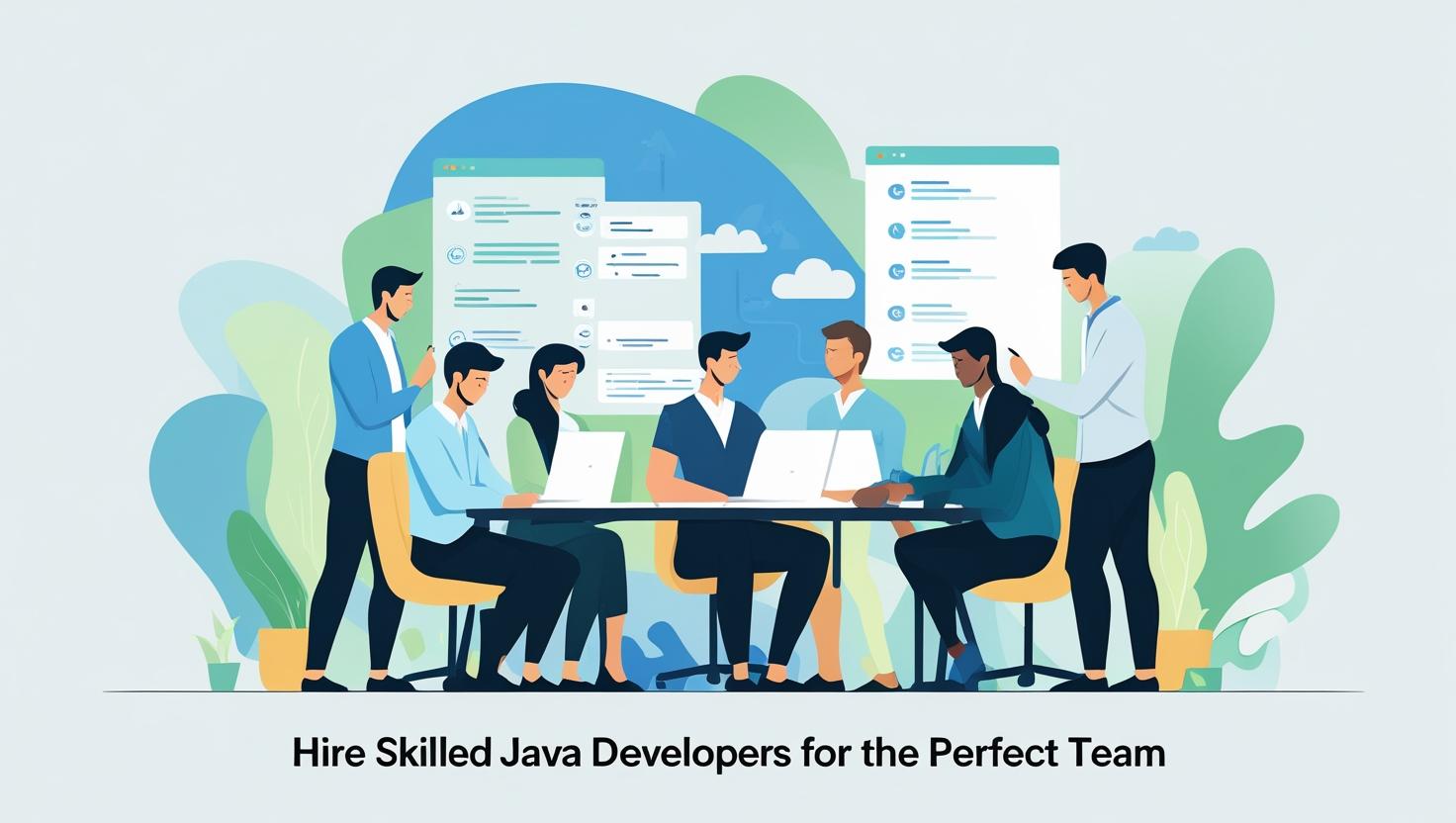Business
Hire Skilled Java Developers for the Perfect Team

Introduction
Java remains one of the most popular programming languages worldwide. According to the 2024 Stack Overflow Developer Survey, Java ranks consistently among the top three languages used by professional developers globally. Its versatility, robustness, and extensive ecosystem make it a preferred choice for enterprise applications, mobile development, and cloud solutions.
As businesses increasingly rely on Java to power their critical systems, the demand for skilled Java developers continues to rise. The challenge, however, lies in assembling a team that not only has technical expertise but also fits well with your project needs and company culture.
Why Building a Strong Java Team Matters
Java projects often involve complex systems that require collaboration across multiple roles — backend developers, testers, architects, and more. The quality of your Java team directly impacts:
- Project delivery speed
- Code quality and maintainability
- Ability to innovate and adapt
- Long-term success of software products
Hiring the right talent and structuring your team correctly can reduce project risks and improve overall efficiency.
Key Skills to Look for When You Hire Java Developers
Not all Java developers bring the same level of expertise or experience. When you seek to hire Java developers, consider the following skills and attributes:
1. Core Java Knowledge
- Deep understanding of Java SE (Standard Edition) including OOP principles
- Familiarity with Java 8+ features like streams, lambdas, and the new Date/Time API
- Proficiency with collections framework, exception handling, and multithreading
2. Frameworks and Libraries
- Experience with Spring Framework (Spring Boot, Spring MVC, Spring Security)
- Knowledge of Hibernate or other ORM tools
- Familiarity with Apache Maven or Gradle for build automation
3. Database Skills
- Strong skills in SQL and relational database design (MySQL, PostgreSQL, Oracle)
- Experience with NoSQL databases like MongoDB or Cassandra is a plus
4. Web Technologies
- Understanding of RESTful API design and development
- Experience with front-end technologies like JavaScript, HTML, and CSS adds value
5. Testing and Debugging
- Competence in unit testing frameworks such as JUnit or TestNG
- Ability to write integration and system tests
- Debugging skills and experience with profiling tools
6. DevOps and Cloud
- Knowledge of CI/CD pipelines (Jenkins, GitLab CI)
- Familiarity with containerization (Docker, Kubernetes)
- Cloud platforms experience (AWS, Azure, Google Cloud)
7. Soft Skills
- Good communication and teamwork skills
- Problem-solving mindset and adaptability
- Attention to detail and a focus on code quality
Best Practices for Hiring Java Developers
A smooth hiring process attracts top talent:
- Write Clear Job Descriptions: List must-have skills, responsibilities, and project goals.
- Use Multiple Channels: Post on job boards, LinkedIn, and specialized developer forums.
- Offer Competitive Packages: Research market rates and add perks like remote work or flexible hours.
- Streamline Screening: Use short coding tests or take-home assignments to filter candidates early.
- Engage Quickly: Keep candidates informed to prevent drop-offs.
A positive candidate experience boosts your reputation. Skilled Java developers often juggle offers, so a well-organized process helps you stand out.
Interview Questions to Assess Java Expertise
Good questions reveal depth of knowledge:
- Core Concepts: “Explain the difference between ArrayList and LinkedList.”
- Concurrency: “How do you prevent race conditions in multithreaded code?”
- Design Patterns: “Which design patterns have you used and why?”
- Frameworks: “Describe how you’ve used Spring Boot in past projects.”
- Problem Exercise: “Write a method to reverse a linked list.”
Keep interviews conversational. Encourage candidates to walk through their thought process. This approach shows how they tackle real-world challenges and collaborate under pressure.
Leveraging Remote Java Talent
Remote work opens a global talent pool. To succeed:
- Use Reliable Tools: Choose collaboration platforms like GitHub, Jira, and Zoom.
- Set Clear Goals: Define tasks, deadlines, and coding standards from day one.
- Build Culture: Schedule regular check-ins, virtual team lunches, and recognition moments.
- Manage Time Zones: Overlap working hours to boost real-time collaboration.
With the right setup, a remote Java development team can match or exceed the output of in-office groups while offering flexibility to developers.
Onboarding and Retaining Your Java Team
Retention starts at onboarding:
- Welcome Pack: Provide coding guidelines, project overviews, and login credentials on day one.
- Mentoring: Pair new hires with senior developers for guidance and support.
- Training: Offer workshops on new Java frameworks and best practices.
- Feedback: Hold weekly check-ins to discuss progress and any roadblocks.
- Growth Paths: Define clear career tracks with milestones and training budgets.
Investing in your team’s growth shows you value their skills and career. This shared commitment builds loyalty and reduces turnover.
How to Effectively Assess Java Developer Candidates
The hiring process can make or break your team’s future. Consider the following methods to evaluate candidates thoroughly.
1. Technical Screening
- Use coding tests focused on algorithmic challenges and Java-specific problems
- Evaluate understanding of Java syntax, APIs, and best practices
2. Practical Assignments
- Assign real-world tasks such as building a simple REST API or fixing bugs in a sample project
- Check for code readability, design choices, and test coverage
3. Behavioral Interviews
- Ask about past projects and how candidates handled challenges or worked within a team
- Assess communication skills and cultural fit
4. Peer Interviews
-
Have senior Java developers or architects interview candidates to assess technical depth and teamwork ability
5. Reference Checks
-
Contact previous employers or clients to verify work ethics and performance
In-House Hiring vs. Outsourced Java Development
1. In-House Hiring
Advantages:
- Close communication and collaboration
- Better control over project direction
- Easier to build a long-term company culture
Challenges:
- Higher recruitment and salary costs
- Limited access to the global talent pool
- Longer onboarding times
2. Outsource Java Development
Advantages:
- Access to skilled developers worldwide
- Cost-effective, especially for short-term or specialized projects
- Faster scaling of team size
Challenges:
- Communication across time zones
- Risk of less control over processes
- Potential quality and security concerns without proper vetting
Also Read: Custom Manufacturing Software for Business Growth 2025
Tips for Building a Balanced Java Team
Creating a well-rounded Java team requires more than just hiring developers with strong coding skills. Consider these points:
1. Mix Junior and Senior Developers
A balanced team with both juniors and seniors encourages knowledge sharing and mentorship. Seniors provide architectural guidance while juniors bring fresh ideas.
2. Define Clear Roles and Responsibilities
- Backend Developers: Focus on core Java, APIs, and business logic
- QA Engineers: Ensure code quality and automate testing
- DevOps Engineers: Manage deployment, infrastructure, and CI/CD
- Project Manager: Keeps timelines and communication on track
3. Foster Continuous Learning
Encourage the team to stay updated on Java ecosystem changes and best practices. Regular training and tech talks can help maintain high standards.
4. Prioritize Communication and Collaboration Tools
Use platforms like Jira, Slack, GitHub, and Confluence to keep everyone aligned and productive, especially for remote or outsourced teams.
Sample Java Team Structure
| Role | Key Responsibilities | Experience Level |
|---|---|---|
| Java Architect | System design, tech strategy | 8+ years |
| Senior Java Developer | Complex coding, mentoring juniors | 5-8 years |
| Junior Java Developer | Implement features, bug fixing | 1-3 years |
| QA Engineer | Automated/manual testing | 3-5 years |
| DevOps Engineer | CI/CD, cloud infrastructure management | 3-5 years |
| Project Manager | Coordination, timeline management | 5+ years |
Why Now Is the Right Time to Hire Java Developers
The global software development market is growing steadily, and Java remains central to many mission-critical applications. According to Gartner, enterprise IT spending on cloud and digital transformation is increasing by nearly 15% annually. Java’s role in backend services, microservices architectures, and cloud platforms ensures steady demand for skilled developers.
Companies that hire the right Java talent today gain a competitive advantage by accelerating their digital projects. Whether you decide to build an in-house team or outsource Java development, careful planning and execution of your hiring strategy will pay dividends.
Conclusion
Building the perfect Java team requires a clear understanding of your project requirements and the skills needed. By focusing on both technical expertise and soft skills, you can assemble a team capable of delivering robust, scalable applications.
Whether you choose to hire Java developers internally or partner with a specialized vendor to outsource Java development, thorough assessment and strategic planning are essential. Investing in the right talent will position your business for long-term success in an increasingly digital world.
If you’re looking for expert Java development services or need help building your team, consider reaching out to trusted development partners. Careful selection now will ensure smoother project execution and better outcomes.
Business
Comme des Garçons: The Essence of Avant-Garde Fashion

If you’re on a quest for fashion that defies convention and worrying conditions the norms, look no similarly than Comme des Garçons. This avant-garde logo has captivated fashion fanatics round the sector with its specific aesthetic and boundary-pushing designs. Founded through manner of method of Rei Kawakubo in 1969, Comme des Garçons is extra than virtually clothing—it’s far a philosophy that encourages self-expression and creativity.
Whether you’re a seasoned collector or new to the world of immoderate fashion, knowledge this iconic label can redesign your fabric cupboard into a few issue absolutely extraordinary. Let’s dive deeper into what makes Comme des Garçons so specific and the manner you can choose quantities that resonate collectively in conjunction with your personal style.
The History of the Brand commesdesgarcons
Commes des Garçons emerged in 1969, primarily based totally through manner of method of the visionary style designer Rei Kawakubo in Tokyo. The logo short captured hobby with its avant-garde method to fashion. Kawakubo challenged conventional norms, growing quantities that blurred the lines amongst art work and utility.
Her designs often featured asymmetry, deconstruction, and a monochromatic palette. In the 1980s, CommesdesGarçons made waves internationally after debuting at Paris Fashion Week. It turn out to be proper right here that Kawakubo delivered her radical mind to a global audience. This technology marked a large shift in fashion, influencing limitless designers who followed. The logo have turn out to be synonymous with innovation and rebellion in competition to mainstream aesthetics.

The Philosophy behind commes des garcons
Commes des Garçons embodies an in depth method to fashion. Founded through manner of method of Rei Kawakubo in 1969, the logo worrying conditions conventional norms. It invites wearers to see clothing as art work in choice to mere cloth. Kawakubo’s philosophy emphasizes deconstruction and asymmetry. This creates quantities that often defy traditional silhouettes.
The goal is not virtually to dress but to provoke concept and emotion. Color palettes are deliberately muted or stark, enhancing the uniqueness of each design. Commes des Garçons encourages human beings to specific their identity boldly without conforming. The logo moreover embraces imperfection, celebrating flaws as part of beauty. Each item tells a story, inviting conversations about culture and society through fashion.
How to Choose the Perfect commesdesgarcons Piece
Choosing the appropriate Comme des Garçons piece is an thrilling journey. Start through manner of method of identifying your personal style. Are you drawn to avant-garde silhouettes or minimalist designs? Knowing what resonates with you can narrow down your options. Next, consider the match.
Comme des Garçons often plays with shapes and proportions, so trying items on is critical. A loose-turning into top might be a statement piece while tailored trousers can growth any outfit. Don’t neglect about approximately shadeation and pattern. The logo embraces bold prints and unconventional sun sunglasses that can make a strong impression.
Think about how the ones elements complement your gift fabric cupboard. The textures applied in Comme des Garçons collections can variety drastically—from gentle cottons to mounted wools—each supplying a totally specific vibe for any occasion. Enjoy exploring the severa worldwide of this iconic label!
Factors to Consider When Buying Commes des Garcons
When searching for Commes des Garçons, it’s far critical to consider your personal style. The logo is thought for its avant-garde designs that often mission traditional fashion norms. Sizing can be tricky. Each collection also can moreover have unique fits, so continuously take a look at the sizing chart or try items on if possible.
Quality is paramount. Look at the cloth and advent details; they replicate the craftsmanship on the lower back of each piece. Budget topics too. While making an funding in a statement item can growth your fabric cupboard, it’s far smart to balance splurge quantities with extra low priced options. Think about versatility.
Choose items that can with out troubles combo and match with extraordinary clothing in your fabric cupboard for max wearability. Keep a be careful for confined versions or collaborations. These specific quantities often grow to be collectors’ items over time and add great flair to any outfit.
Tips for Shopping at Commes des Garcons
Shopping at Comme des Garçons can be an interesting enjoy. It’s a journey into the avant-garde worldwide of fashion. Start through manner of method of exploring their large collections online. Familiarize yourself with unique lines, like PLAY or Homme Plus. Each has its specific vibe and aesthetic. Visit flagship stores if possible.
The layout often shows Rei Kawakubo’s current designs, supplying a sensory enjoy this is going beyond clothing. Don’t hesitate to try on quantities you’ll now no longer generally consider. The beauty of Comme des Garçons lies in breaking conventions and embracing individuality. Pay hobby to sizing; it could variety drastically at some point of collections. Check cross lower back pointers in advance than purchasing, specifically for online orders.
Embracing the Unique and Bold Style of Commes des Garcons
Embracing the perfect and bold style of Comme des Garçons manner stepping outdoor conventional fashion norms. The logo prospers on experimentation, hard traditional silhouettes and aesthetics. Each piece tells a story, often evoking emotions that byskip beyond mere clothing.
When you placed on Comme des Garçons, you’re now not virtually growing a fashion statement; you’re expressing individuality and creativity. This is an opportunity to reveal off your personal style in an actual manner. Mixing textures, patterns, and shapes can purpose surprising however stunning combinations. Don’t shrink back from bolder choices—encompass them! Whether it’s far oversized jackets or choppy designs, the ones quantities are designed to stand out.
Business
What Is the Masjid Sound System Price in Lahore Today?

A reliable sound system is one of the most important components of any mosque. From the Azaan to daily prayers, Jummah khutbah, and religious lectures, clear audio ensures that every worshipper can listen without difficulty. Many mosque committees and administrators often search for updated details about masjid sound system price in Lahore to plan installations or upgrades within their available budget.
Lahore, being a major metropolitan city, offers a wide variety of mosque audio systems. Whether you are setting up a small neighborhood masjid or equipping a large Jamia mosque, the total cost depends on equipment quality, wattage, number of speakers, amplifier capacity, and professional installation. Understanding these factors will help you make a smart and long-term investment.
Why Is a High-Quality Masjid Sound System Important?
A mosque sound system is not simply about loud volume. It is about delivering clear, distortion-free sound across indoor and outdoor spaces. Poor-quality equipment can cause echo, feedback noise, and uneven sound distribution, which may disturb worshippers during prayers.

Clear Azaan Transmission
Outdoor horn speakers are primarily used to broadcast the Azaan to surrounding areas. In a busy city like Lahore, powerful and weather-resistant speakers are necessary to ensure that the call to prayer is audible without harsh distortion.
Balanced Indoor Audio
Inside the mosque, column speakers or wall-mounted speakers distribute sound evenly throughout the prayer hall. This ensures that the Imam’s voice reaches the back rows clearly without creating uncomfortable noise levels.
Comfortable Listening Experience
A properly tuned system prevents excessive volume, echo, and audio feedback. A peaceful and clear sound environment enhances the spiritual experience for worshippers.
Masjid Sound System Price in Lahore – Current Market Overview
The cost of a mosque sound system in Lahore depends on multiple components including speakers, amplifiers, microphones, mixers, wiring, and installation services. Below is a general price estimate available in the local market.
Outdoor Horn Speakers
Horn speakers are installed on rooftops or minarets for long-distance sound projection.
- 30W to 50W horn speakers: PKR 4,000 – PKR 9,000
- 60W to 100W horn speakers: PKR 10,000 – PKR 22,000
- Heavy-duty imported horn speakers: PKR 22,000 – PKR 45,000+
These speakers are designed to withstand heat, dust, and rain.
Indoor Column Speakers
Column speakers provide even sound coverage inside the mosque.
- Basic column speakers: PKR 12,000 – PKR 25,000
- Premium column speakers: PKR 30,000 – PKR 75,000
Higher-end models offer superior voice clarity and reduced echo.
Amplifiers for Mosque Audio Systems
An amplifier powers and controls the speakers.
- 120W to 250W amplifiers: PKR 20,000 – PKR 50,000
- 300W to 500W amplifiers: PKR 50,000 – PKR 110,000
Modern amplifiers often include echo adjustment, equalizers, and multiple microphone inputs.
Microphones and Accessories
- Wired microphones: PKR 3,000 – PKR 12,000
- Wireless microphone systems: PKR 15,000 – PKR 50,000
- Mixer units and audio processors: PKR 25,000 – PKR 80,000
- Professional wiring and stands: PKR 15,000 – PKR 40,000
Complete Masjid Sound System Cost in Lahore
If you plan to install a full system including speakers, amplifier, microphones, mixer, wiring, and professional installation, the total estimated cost may range from:
- Small mosque setup: PKR 100,000 – PKR 200,000
- Medium mosque setup: PKR 300,000 – PKR 600,000
- Large Jamia mosque setup: PKR 700,000 – PKR 2,000,000+
The final price depends on mosque size, brand selection, and technical requirements.
Factors Affecting Masjid Sound System Prices in Lahore
Several important elements influence the overall cost.
Brand Reputation and Build Quality
Well-known audio brands typically offer better durability and clearer sound, which increases price. However, some local brands provide affordable and reliable alternatives.
Mosque Size and Architecture
Large prayer halls with high ceilings require more speakers and higher wattage amplifiers. Complex layouts may also require advanced sound planning.
Installation Complexity
Professional installation ensures proper speaker placement and wiring. Installation charges in Lahore can range from PKR 20,000 to PKR 80,000 depending on project size.
Imported vs Local Equipment
Imported sound systems are often more expensive due to currency exchange rates and shipping costs. However, they may offer advanced features and longer lifespan.
How to Choose the Best Masjid Sound System in Lahore?
Selecting the right system requires careful evaluation and expert guidance.
Conduct a Sound Assessment
Before purchasing, evaluate the mosque’s size, ceiling height, and layout. A professional sound technician can recommend the right number of speakers and amplifier capacity.
Use Separate Indoor and Outdoor Systems
Outdoor horn speakers should be dedicated to Azaan, while indoor column speakers handle sermons and prayers. This improves sound clarity and prevents distortion.
Focus on Sound Clarity Over Loudness
Excessive volume can create discomfort and echo. Choose equipment that provides crisp and balanced audio instead of simply high wattage.
Request a Live Demonstration
Ask suppliers in Lahore for a sound demo before finalizing your purchase. Testing ensures the equipment meets your expectations.
Benefits of Investing in a Professional Mosque Sound System
Installing a high-quality audio setup provides several long-term advantages:
- Clear and effective communication during prayers
- Enhanced spiritual atmosphere
- Reduced maintenance and repair costs
- Long-lasting equipment durability
- Improved community satisfaction
A well-installed sound system strengthens the mosque’s operations and creates a comfortable prayer environment.
Where to Buy Masjid Sound Systems in Lahore?
Lahore offers multiple options for purchasing mosque audio equipment. You can explore:
- Hall Road electronics market
- Professional audio equipment dealers
- Authorized distributors
- Online marketplaces offering delivery across Lahore
Before purchasing, compare prices, check warranty policies, and confirm after-sales service.
Maintenance Tips for Long-Term Performance
Proper maintenance ensures your mosque sound system performs efficiently for years.
- Clean outdoor speakers regularly to remove dust
- Inspect wiring connections periodically
- Use voltage stabilizers to protect equipment
- Schedule annual professional sound inspections
Regular maintenance reduces repair costs and extends equipment lifespan.
Conclusion
What is the masjid sound system price in Lahore, and which setup is best for your mosque? The answer depends on your mosque’s size, sound requirements, and available budget. Lahore’s market offers a wide range of options, from affordable basic systems to advanced professional installations for large Jamia mosques.
Investing in a high-quality mosque sound system ensures clear Azaan transmission, balanced indoor audio, and long-term reliability. By carefully assessing your needs and consulting experienced audio suppliers, you can select the ideal setup that provides a peaceful and comfortable spiritual experience for your community.
Business
Business Intelligence: Transforming Data into Strategic Insights

In today’s competitive landscape, organizations generate massive volumes of data from sales, marketing, operations, finance, and customer interactions. Yet, data alone does not create value. What truly matters is how effectively businesses turn that data into insights. A well-implemented business intelligence system enables companies to convert raw information into strategic decisions that drive measurable results.
Understanding the Foundation of Business Intelligence
At its core, a BI framework collects, integrates, analyzes, and visualizes data from multiple sources. Instead of relying on spreadsheets or fragmented reports, leaders gain a centralized view of performance metrics in real time. This clarity empowers departments to collaborate, align goals, and identify opportunities faster.
Many organizations often ask, how do business intelligence and business analytics support decision making? The answer lies in structured data analysis combined with predictive modeling. While business intelligence focuses on historical and real-time reporting, analytics digs deeper into trends, forecasting, and pattern recognition. Together, they create a powerful decision-support ecosystem.

Key Components of a Modern BI Environment
A robust BI framework typically includes:
- Data integration tools to consolidate information from various systems
- Data warehouses for structured storage
- Dashboards and visualization platforms
- Reporting tools for operational and strategic insights
- Security and governance controls
When these components work together, businesses move from reactive decision-making to proactive strategy development.
Why Organizations Need an Advanced BI Approach
Companies that depend on manual reporting often struggle with delays, inaccuracies, and inconsistent metrics. A centralized bi system eliminates these challenges by offering automated data processing and standardized reporting structures.
Here’s how modern BI transforms operations:
- Improved Visibility: Executives gain real-time insights into KPIs.
- Faster Reporting: Automated dashboards reduce dependency on IT teams.
- Better Forecasting: Historical data analysis improves future planning.
- Increased Accountability: Transparent metrics align teams with performance goals.
When implemented correctly, organizations clearly understand how business intelligence helps in decision making across departments, from finance to marketing.
The Role of Data-Driven Culture
Technology alone cannot guarantee success. Companies must foster a culture of data driven business intelligence, where decisions are supported by evidence rather than assumptions. This shift requires:
- Leadership commitment
- Employee training
- Accessible reporting tools
- Clear data governance policies
When employees trust the data and understand how to use it, adoption increases significantly. Teams begin to rely on insights rather than intuition.
Factors That Define Success
Several factors of business intelligence system implementation determine long-term success:
- Data accuracy and consistency
- Scalability of infrastructure
- User-friendly dashboards
- Strong security framework
- Integration capabilities with ERP and CRM platforms
Organizations that carefully evaluate these elements are more likely to build solutions that evolve with business growth.
Strategic Benefits Across Departments
A comprehensive BI environment delivers value to multiple business functions:
Finance Teams: Gain accurate revenue forecasting, expense monitoring, and profitability analysis.
Sales Teams: Track pipeline performance, identify conversion trends, and monitor customer behavior.
Marketing Departments: Measure campaign ROI, segment audiences effectively, and analyze engagement patterns.
Operations Managers: Monitor supply chain performance and identify inefficiencies.
These cross-functional insights enable alignment between short-term activities and long-term objectives.
Scalability and Future Readiness
As businesses grow, data volumes increase exponentially. Organizations must design effective business intelligence systems that scale without performance issues. Cloud-based infrastructure, flexible storage, and modular analytics tools ensure that BI platforms can handle expansion seamlessly.
Scalable BI solutions also support emerging technologies such as artificial intelligence and machine learning, enabling predictive insights and automated decision recommendations.
Real-World Applications
Companies across industries leverage BI for competitive advantage:
- Retailers analyze purchasing patterns to optimize inventory.
- Manufacturing firms monitor production efficiency and reduce downtime.
- Financial institutions assess risk exposure in real time.
- Healthcare providers track patient outcomes and operational metrics.
In each case, data becomes a strategic asset rather than a byproduct of operations.
Overcoming Common Challenges
Despite its benefits, BI implementation can face obstacles:
- Poor data quality
- Resistance to change
- Lack of executive sponsorship
- Inadequate training
To overcome these challenges, organizations must prioritize clear communication, stakeholder involvement, and phased deployment strategies. When users understand the business value, adoption improves significantly.
Measuring Return on Investment
The impact of BI is measurable. Key performance indicators may include:
- Reduced reporting time
- Increased revenue through optimized strategies
- Lower operational costs
- Improved customer retention
Tracking these metrics ensures continuous improvement and justifies technology investments.
Choosing the Right BI Partner
Selecting the right technology partner plays a crucial role in success. Businesses should evaluate vendors based on:
- Industry expertise
- Customization capabilities
- Integration flexibility
- Support and training services
- Proven implementation track record
A reliable partner ensures smoother deployment and long-term scalability.
The Future of Business Intelligence
The next generation of BI focuses on automation, artificial intelligence integration, and self-service analytics. Organizations will increasingly rely on predictive insights rather than descriptive reporting alone. Embedded analytics within operational systems will further streamline workflows.
As competition intensifies, companies that leverage intelligent data strategies will outperform those relying on outdated reporting methods.
Final Thoughts
In a data-saturated world, businesses cannot afford to operate without structured insights. A powerful BI framework empowers leaders to make faster, more accurate, and more strategic decisions. From improving operational efficiency to identifying new revenue opportunities, the benefits are transformative.
If your organization is ready to elevate its analytics capabilities and build a scalable, insight-driven environment, partnering with experts makes all the difference. Century Software helps businesses implement advanced intelligence solutions that drive measurable growth and long-term success.
-
Business3 years ago
Cybersecurity Consulting Company SequelNet Provides Critical IT Support Services to Medical Billing Firm, Medical Optimum
-
Business3 years ago
Team Communication Software Transforms Operations at Finance Innovate
-
Business3 years ago
Project Management Tool Transforms Long Island Business
-
Business3 years ago
How Alleviate Poverty Utilized IPPBX’s All-in-One Solution to Transform Lives in New York City
-
health3 years ago
Breast Cancer: The Imperative Role of Mammograms in Screening and Early Detection
-
Sports3 years ago
Unstoppable Collaboration: D.C.’s Citi Open and Silicon Valley Classic Unite to Propel Women’s Tennis to New Heights
-
Art /Entertainment3 years ago
Embracing Renewal: Sizdabedar Celebrations Unite Iranians in New York’s Eisenhower Park
-
Finance3 years ago
The Benefits of Starting a Side Hustle for Financial Freedom






























